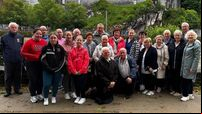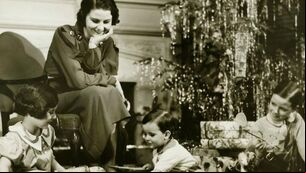Kerry Babies story a reminder of our dark not so distant past

Today’s young women can’t quite believe what they’re hearing and, looking back on it, I find myself time-travelling to an era that makes me shudder.
But at the time, we knew nothing else. There was the behemoth of the Catholic Church that many of us were rebelling against. But sometimes, it felt like we’d never fully throw off its shackles.
On a superficial level, the 1980s were all about Madonna and shoulder pads. And of course, escaping from Eire if you couldn’t get a job or couldn’t live in a country where the Church held a lot more sway than it does today.
Women were not fully free to control their fertility. I recall doing a vox pop for a pirate radio station on the streets of Cork asking people if they thought that condoms should be made available. That was the kind of nonsense that pre-occupied the news agenda.
As late as 1990, the Virgin Megastore in Dublin was fined £500 for selling condoms!
Joanne Hayes, the woman at the centre of the Kerry Babies scandal, was effectively put on trial when a tribunal was set up to enquire into the circumstances in which she and her family had signed confessions to a crime they had not committed.
One lawyer alone asked Joanne 2,216 incredibly personal questions. It’s no wonder she got sick and had to be sedated.
Joanne’s married lover, Jeremiah Locke, with whom she had a daughter as well as the infant that died, was asked at the public tribunal: “Was she a virgin when you first had intercourse with her? How many other boys or men had Joanne had intercourse with, other than yourself?”
It was horrendous. Author, journalist and feminist, Nell McCafferty made the following observation in the Irish Press: “This inquiry is supposed to be about the events in Tralee Garda Station, but so far, due to the nature of the questions asked, it is about mattresses and the men in Joanne Hayes’s life and her private behaviour with them.”
As Journalist, John Barrett, wrote in the preface to My Story: Joanne Hayes, which he co-authored: ‘It seemed she was on trial, and not just her but all women.”
The Dáil committee on women’s rights at the time described the questioning of Joanne as “insensitive, harrowing, horrific and shameful”.
And the hypocrisy of some of the men was breathtaking.
In A Woman to Blame, McCafferty’s excellent book about the Kerry Babies story, she wrote: “In the opening days of the ‘Kerry Babies’ tribunal, a married man went to bed in a Tralee hotel with a woman who was not his wife. He was one of the 43 male officials — judge, 15 lawyers, three police superintendents and 24 policemen — engaged in a public probe of the private life of Joanne Hayes.
“When this particular married man was privately confronted with his own behaviour, he initially denied it. Then, he crumpled into tears and asked not to be exposed. He had so much to lose, he said. “My wife... my job.... my reputation.”
He was assured of discretion. No such discretion was assured to Joanne Hayes, as a succession of professional men, including this married man, came forward to strip her character.”
Deep-rooted misogyny is at the root of men’s suspicion of women who, back in the not so-distant past, ‘transgressed’ by taking lovers outside of marriage.
The craziness of what became known as the superfecundation theory whereby Joanne, following sexual intercourse with Jeremiah Locke, had sex with another man within 48 hours of being with her long-term lover — becoming pregnant with twins — is an indicator of just how keen the authorities were to nail Joanne for the murder of the Cahirciveen baby.
Interestingly, the official Garda file, compiled by Detective Garda PJ Browne, made this important observation: “The possibility exists that the baby found at Cahirciveen on April 14, 1984, is the baby of Joanne Hayes. The converse probability that it is not her baby is more likely.”
Reliance on possibility rather than something more solid resulted in the awful mess that Joanne found herself in — being unjustly charged with the brutal murder of a newborn baby boy.
While this sorry saga in our recent history has been dragged up again, resulting in apologies to Joanne from the State and from the gardaí, we shouldn’t forget the woman at the centre of it all.
Joanne Hayes never wanted the limelight but her name is a lightning rod for all the wrongs against women in our history.







 App?
App?




